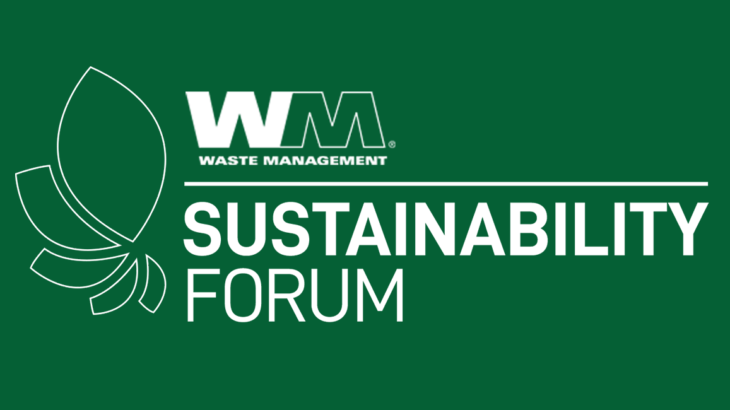
WMPO 2020 Sustainability Forum
Mark your calendars! The annual WMPO Sustainability Forum is happening on January 30, 2020. Our annual conference aims to benefit the planet and your business.
Since 1971, Waste Management’s mission has been environmental performance. We seek to maximize resource value, while minimizing environmental impact so that our economy, our people, and our environment can thrive. We know that is a big mission. As industry leaders, we seek to lead and galvanize the world towards this common goal. Knowing this can’t be done alone, we introduced the Waste Management Sustainability Forum.
Join us for our ninth year of this one-day conference. We’ll be joined by accomplished leaders and innovative thinkers who practice and advocate for the greater good, which is inherently part of what it means to have a mission in sustainability. Register today to discuss the environmental, social, and economic aspects of sustainability and learn how you can make the world a better, more sustainable place.
Mark your calendars and join the exchange of ideas on Thursday, January 30, 2020 via live stream video accessible from this page.
2020 AGENDA | THURSDAY, JANUARY 30, 2020
7:30 a.m. – 8:00 a.m.
Registration & Breakfast
8:00 a.m. – 8:05 a.m.
Welcome
Tara Hemmer, Senior Vice President Operations, Waste Management
8:05 a.m. – 8:35 a.m.
Keynote
Jim Fish, President & CEO, Waste Management
8:35 a.m. – 9:00 a.m.
Keynote
Christiana Figueres, Former Executive Secretary, UNFCCC (2010-2016), Founding Partner, Global Optimism Ltd. And Convenor, Mission 2020
9:00 a.m. – 10:00 a.m.
Fireside Chat
John Kerry, 68th Secretary of State (2013-2017)
10:00 a.m. – 10:20 a.m.
Break
10:20 a.m. – 11:00 a.m.
Keynote
Peter Zeihan, Geopolitical Strategist and Founder of Zeihan on Geopolitics
11:00 a.m. – 12:10 p.m.
CEO Panel
12:10 p.m. – 12:15 p.m.
Forum Wrap-Up
12:15 p.m. – 1:45 p.m.
Lunch
1:45 p.m. – 2:30 p.m.
Recycling Demand Panel
2:30 p.m. – 4:00 p.m.
Breakouts
Attendees will be able to choose one of the sessions below.
4:00 p.m. – 5:00 p.m.
Post Forum Reception
Agenda is subject to change.
Packaging Policy
Packaging continues to gain attention with the public outcry about plastic waste in the environment, a backlash to single-use packaging and challenges associated with e-commerce converges with global market conditions, impacting recycling programs across the globe.
In this session, we’ll get a snapshot of the challenges faced by manufacturers, recyclers and communities. Paper? Plastics? Compostable? Reduction? Ban? Is there a right answer? Join us for a lively discussion about packaging policy in the U.S. to discover where we are and where we are going from here.
Food Policy
For many years, our efforts focused on the end-of-life collection of food waste for composting or digestion. Yet, US EPA’s lifecycle analysis taught us that upstream prevention and reduction efforts are 6-7 times better for the environment than end-of-life composting or digestion. Subsequent studies support enormous cost savings to consumers and businesses when we work to reduce food waste by preventing it in the first place. US EPA and several states have begun to focus on an upstream approach for managing food rather than end-of-life alternatives.
In this session, experts will discuss their analysis and subsequent programs for managing food. You’ll also have the chance to talk to experts in your industry about how to cut costs and emissions in your community, at your home and in your business.
Textiles
The growth of fast fashion has created an emerging problem in the solid waste industry. Tons of garments are worn an average of just 6 times, and then they’re discarded. Textiles are the fastest growing portion of the waste stream, making up 7.6% of material disposed (US EPA 2015). Generation of textiles doubled between 2000 and 2015, while the average use decreased by 36% (EMF 2017). Complex new materials make recycling difficult, and many garments are not desirable for reuse.
In this session, textile and solutions experts will talk about new technologies for managing textiles.






